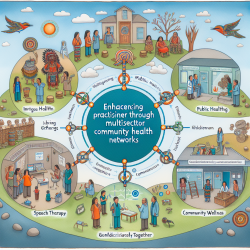Introduction
The field of neurodevelopmental disorders is continuously evolving, with new genetic insights paving the way for more targeted and effective interventions. The recent research on the NR4A2 gene, as highlighted in the study "De novo variants of NR4A2 are associated with neurodevelopmental disorder and epilepsy," offers valuable insights that can significantly impact therapeutic practices. This blog post aims to guide practitioners in integrating these findings into their therapeutic approaches, thereby enhancing the support provided to individuals with neurodevelopmental disorders and epilepsy.
Understanding the NR4A2 Gene
The NR4A2 gene encodes a nuclear receptor transcription factor crucial for the development and function of dopaminergic neurons. Variants in this gene have been linked to developmental delays, epilepsy, and other neurodevelopmental challenges. The study identified several missense and loss-of-function variants in NR4A2, emphasizing its role as a disease gene for neurodevelopmental disorders and epilepsy.
Implications for Practitioners
For practitioners, understanding the genetic underpinnings of neurodevelopmental disorders can enhance diagnostic accuracy and therapeutic efficacy. Here are some ways to implement the findings from the NR4A2 study:
- Genetic Screening: Encourage genetic screening for NR4A2 variants in patients presenting with unexplained developmental delays or epilepsy. Early identification can lead to more personalized intervention strategies.
- Targeted Interventions: Develop therapy plans that consider the specific genetic profiles of patients. This personalized approach can improve outcomes by addressing the unique needs associated with NR4A2-related disorders.
- Collaborative Care: Work closely with geneticists and neurologists to create comprehensive care plans that integrate genetic findings with therapeutic interventions.
- Continued Education: Stay informed about ongoing research in the field of neurogenetics. Attending conferences, webinars, and engaging with professional networks can provide the latest insights and techniques.
Encouraging Further Research
While the study provides significant insights, it also opens the door for further research. Practitioners are encouraged to participate in or support studies that explore the broader implications of NR4A2 variants. Areas for future research include:
- Longitudinal Studies: Investigate the long-term effects of NR4A2 variants on neurodevelopment and the efficacy of different therapeutic approaches over time.
- Intervention Trials: Conduct trials to assess the effectiveness of various therapeutic interventions tailored to NR4A2-related disorders.
- Cross-Disciplinary Collaboration: Foster partnerships between genetic researchers, clinicians, and educators to develop innovative strategies for managing neurodevelopmental disorders.
Conclusion
The research on NR4A2 variants offers a promising avenue for enhancing the understanding and treatment of neurodevelopmental disorders and epilepsy. By integrating these findings into practice, practitioners can provide more effective and personalized care, ultimately improving the quality of life for affected individuals. To read the original research paper, please follow this De novo variants of NR4A2 are associated with neurodevelopmental disorder and epilepsy.










